Law Case Study: Negligence and Duty of Care at Eco Resort
VerifiedAdded on 2023/06/04
|5
|1418
|249
Case Study
AI Summary
This case study analyzes a negligence claim against Phillip Island Eco Resort. The scenario involves a guest, Molly, who sustains severe injuries after diving into a pool at the resort. The study examines the legal duty of care owed by the resort to its guests, focusing on the elements of negligence: duty, breach, and causation. The resort is found to have breached its duty by failing to warn guests about the pool's dangers and the lack of supervision. The application of relevant case laws, such as *Donoghue v Stevenson*, establishes the resort's responsibility. The analysis considers the defense of contributory negligence, suggesting that Molly's actions may have contributed to her injuries. The conclusion determines the resort's negligence and potential for reduced liability based on contributory negligence, supported by citations of legal precedents and legislation, including the Australian Business Law.
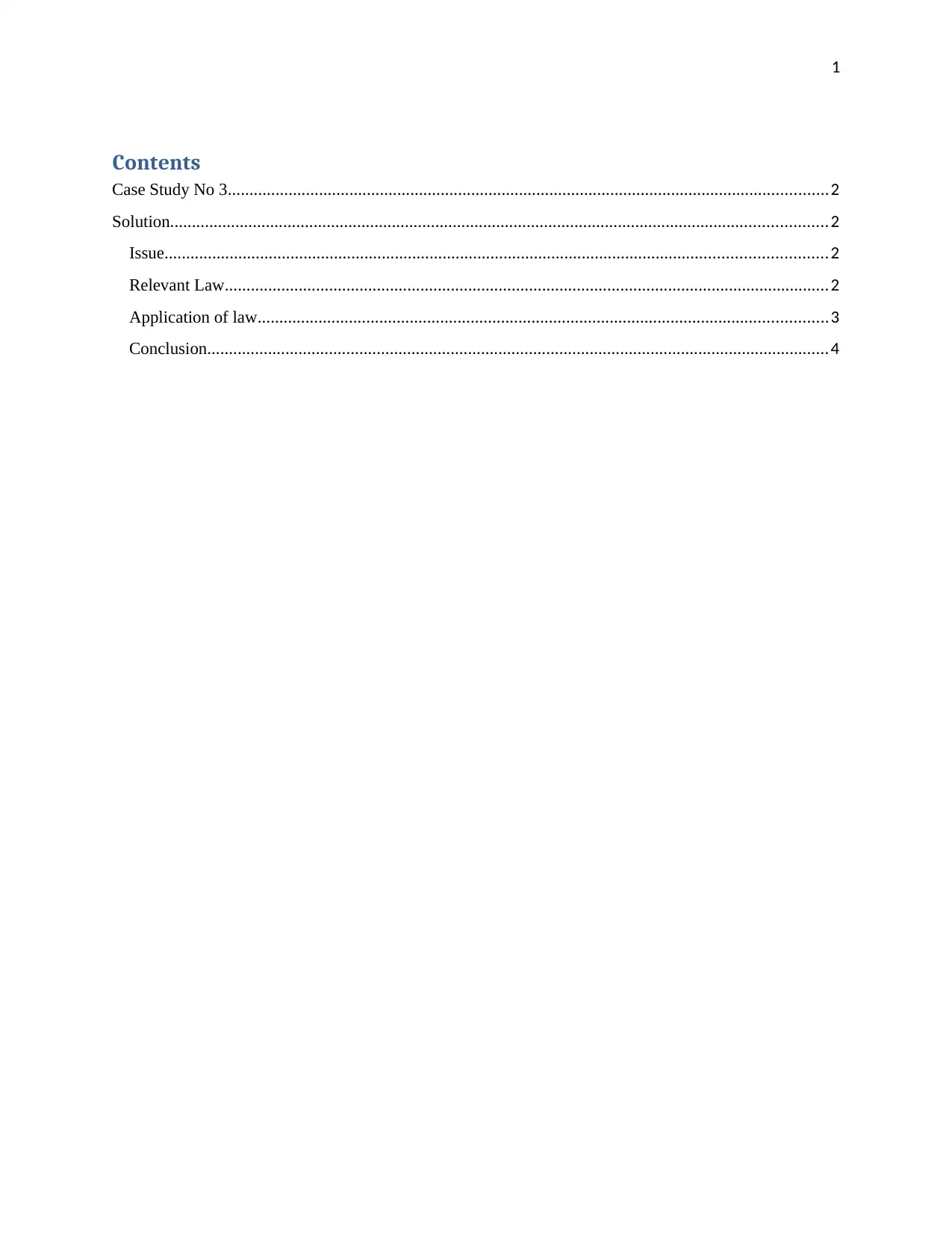
1
Contents
Case Study No 3..........................................................................................................................................2
Solution.......................................................................................................................................................2
Issue........................................................................................................................................................2
Relevant Law...........................................................................................................................................2
Application of law...................................................................................................................................3
Conclusion...............................................................................................................................................4
Contents
Case Study No 3..........................................................................................................................................2
Solution.......................................................................................................................................................2
Issue........................................................................................................................................................2
Relevant Law...........................................................................................................................................2
Application of law...................................................................................................................................3
Conclusion...............................................................................................................................................4
Paraphrase This Document
Need a fresh take? Get an instant paraphrase of this document with our AI Paraphraser
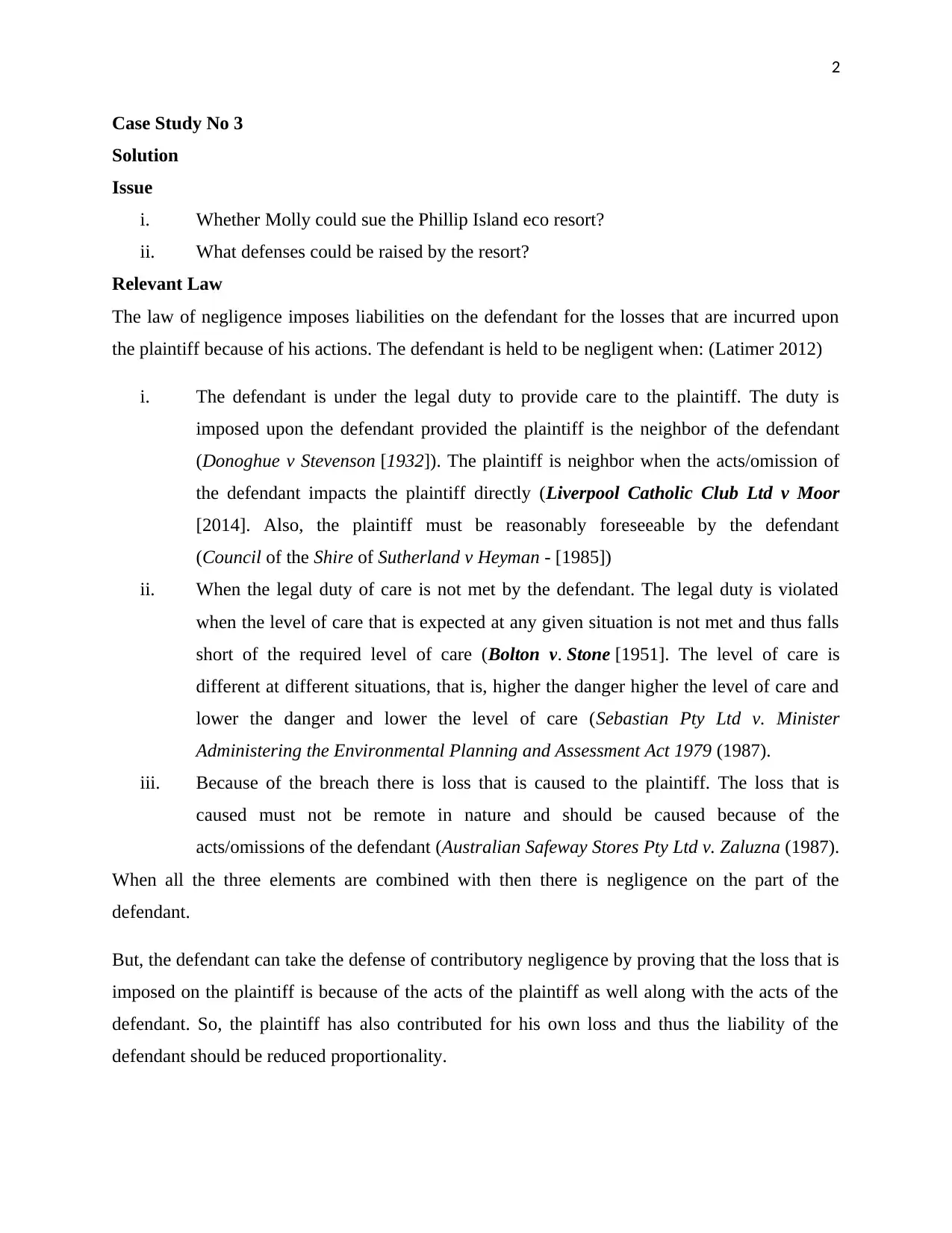
2
Case Study No 3
Solution
Issue
i. Whether Molly could sue the Phillip Island eco resort?
ii. What defenses could be raised by the resort?
Relevant Law
The law of negligence imposes liabilities on the defendant for the losses that are incurred upon
the plaintiff because of his actions. The defendant is held to be negligent when: (Latimer 2012)
i. The defendant is under the legal duty to provide care to the plaintiff. The duty is
imposed upon the defendant provided the plaintiff is the neighbor of the defendant
(Donoghue v Stevenson [1932]). The plaintiff is neighbor when the acts/omission of
the defendant impacts the plaintiff directly (Liverpool Catholic Club Ltd v Moor
[2014]. Also, the plaintiff must be reasonably foreseeable by the defendant
(Council of the Shire of Sutherland v Heyman - [1985])
ii. When the legal duty of care is not met by the defendant. The legal duty is violated
when the level of care that is expected at any given situation is not met and thus falls
short of the required level of care (Bolton v. Stone [1951]. The level of care is
different at different situations, that is, higher the danger higher the level of care and
lower the danger and lower the level of care (Sebastian Pty Ltd v. Minister
Administering the Environmental Planning and Assessment Act 1979 (1987).
iii. Because of the breach there is loss that is caused to the plaintiff. The loss that is
caused must not be remote in nature and should be caused because of the
acts/omissions of the defendant (Australian Safeway Stores Pty Ltd v. Zaluzna (1987).
When all the three elements are combined with then there is negligence on the part of the
defendant.
But, the defendant can take the defense of contributory negligence by proving that the loss that is
imposed on the plaintiff is because of the acts of the plaintiff as well along with the acts of the
defendant. So, the plaintiff has also contributed for his own loss and thus the liability of the
defendant should be reduced proportionality.
Case Study No 3
Solution
Issue
i. Whether Molly could sue the Phillip Island eco resort?
ii. What defenses could be raised by the resort?
Relevant Law
The law of negligence imposes liabilities on the defendant for the losses that are incurred upon
the plaintiff because of his actions. The defendant is held to be negligent when: (Latimer 2012)
i. The defendant is under the legal duty to provide care to the plaintiff. The duty is
imposed upon the defendant provided the plaintiff is the neighbor of the defendant
(Donoghue v Stevenson [1932]). The plaintiff is neighbor when the acts/omission of
the defendant impacts the plaintiff directly (Liverpool Catholic Club Ltd v Moor
[2014]. Also, the plaintiff must be reasonably foreseeable by the defendant
(Council of the Shire of Sutherland v Heyman - [1985])
ii. When the legal duty of care is not met by the defendant. The legal duty is violated
when the level of care that is expected at any given situation is not met and thus falls
short of the required level of care (Bolton v. Stone [1951]. The level of care is
different at different situations, that is, higher the danger higher the level of care and
lower the danger and lower the level of care (Sebastian Pty Ltd v. Minister
Administering the Environmental Planning and Assessment Act 1979 (1987).
iii. Because of the breach there is loss that is caused to the plaintiff. The loss that is
caused must not be remote in nature and should be caused because of the
acts/omissions of the defendant (Australian Safeway Stores Pty Ltd v. Zaluzna (1987).
When all the three elements are combined with then there is negligence on the part of the
defendant.
But, the defendant can take the defense of contributory negligence by proving that the loss that is
imposed on the plaintiff is because of the acts of the plaintiff as well along with the acts of the
defendant. So, the plaintiff has also contributed for his own loss and thus the liability of the
defendant should be reduced proportionality.
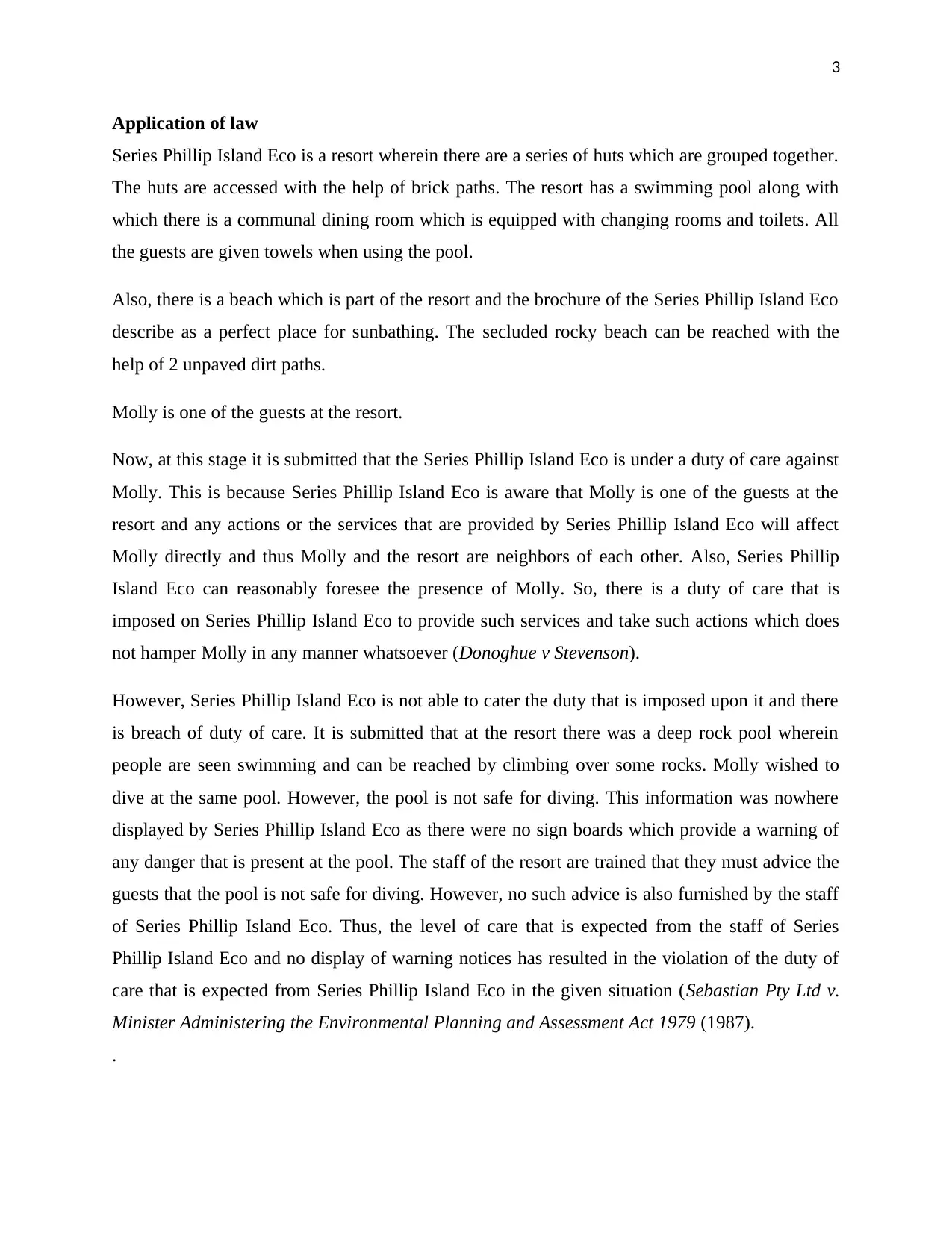
3
Application of law
Series Phillip Island Eco is a resort wherein there are a series of huts which are grouped together.
The huts are accessed with the help of brick paths. The resort has a swimming pool along with
which there is a communal dining room which is equipped with changing rooms and toilets. All
the guests are given towels when using the pool.
Also, there is a beach which is part of the resort and the brochure of the Series Phillip Island Eco
describe as a perfect place for sunbathing. The secluded rocky beach can be reached with the
help of 2 unpaved dirt paths.
Molly is one of the guests at the resort.
Now, at this stage it is submitted that the Series Phillip Island Eco is under a duty of care against
Molly. This is because Series Phillip Island Eco is aware that Molly is one of the guests at the
resort and any actions or the services that are provided by Series Phillip Island Eco will affect
Molly directly and thus Molly and the resort are neighbors of each other. Also, Series Phillip
Island Eco can reasonably foresee the presence of Molly. So, there is a duty of care that is
imposed on Series Phillip Island Eco to provide such services and take such actions which does
not hamper Molly in any manner whatsoever (Donoghue v Stevenson).
However, Series Phillip Island Eco is not able to cater the duty that is imposed upon it and there
is breach of duty of care. It is submitted that at the resort there was a deep rock pool wherein
people are seen swimming and can be reached by climbing over some rocks. Molly wished to
dive at the same pool. However, the pool is not safe for diving. This information was nowhere
displayed by Series Phillip Island Eco as there were no sign boards which provide a warning of
any danger that is present at the pool. The staff of the resort are trained that they must advice the
guests that the pool is not safe for diving. However, no such advice is also furnished by the staff
of Series Phillip Island Eco. Thus, the level of care that is expected from the staff of Series
Phillip Island Eco and no display of warning notices has resulted in the violation of the duty of
care that is expected from Series Phillip Island Eco in the given situation (Sebastian Pty Ltd v.
Minister Administering the Environmental Planning and Assessment Act 1979 (1987).
.
Application of law
Series Phillip Island Eco is a resort wherein there are a series of huts which are grouped together.
The huts are accessed with the help of brick paths. The resort has a swimming pool along with
which there is a communal dining room which is equipped with changing rooms and toilets. All
the guests are given towels when using the pool.
Also, there is a beach which is part of the resort and the brochure of the Series Phillip Island Eco
describe as a perfect place for sunbathing. The secluded rocky beach can be reached with the
help of 2 unpaved dirt paths.
Molly is one of the guests at the resort.
Now, at this stage it is submitted that the Series Phillip Island Eco is under a duty of care against
Molly. This is because Series Phillip Island Eco is aware that Molly is one of the guests at the
resort and any actions or the services that are provided by Series Phillip Island Eco will affect
Molly directly and thus Molly and the resort are neighbors of each other. Also, Series Phillip
Island Eco can reasonably foresee the presence of Molly. So, there is a duty of care that is
imposed on Series Phillip Island Eco to provide such services and take such actions which does
not hamper Molly in any manner whatsoever (Donoghue v Stevenson).
However, Series Phillip Island Eco is not able to cater the duty that is imposed upon it and there
is breach of duty of care. It is submitted that at the resort there was a deep rock pool wherein
people are seen swimming and can be reached by climbing over some rocks. Molly wished to
dive at the same pool. However, the pool is not safe for diving. This information was nowhere
displayed by Series Phillip Island Eco as there were no sign boards which provide a warning of
any danger that is present at the pool. The staff of the resort are trained that they must advice the
guests that the pool is not safe for diving. However, no such advice is also furnished by the staff
of Series Phillip Island Eco. Thus, the level of care that is expected from the staff of Series
Phillip Island Eco and no display of warning notices has resulted in the violation of the duty of
care that is expected from Series Phillip Island Eco in the given situation (Sebastian Pty Ltd v.
Minister Administering the Environmental Planning and Assessment Act 1979 (1987).
.
⊘ This is a preview!⊘
Do you want full access?
Subscribe today to unlock all pages.

Trusted by 1+ million students worldwide
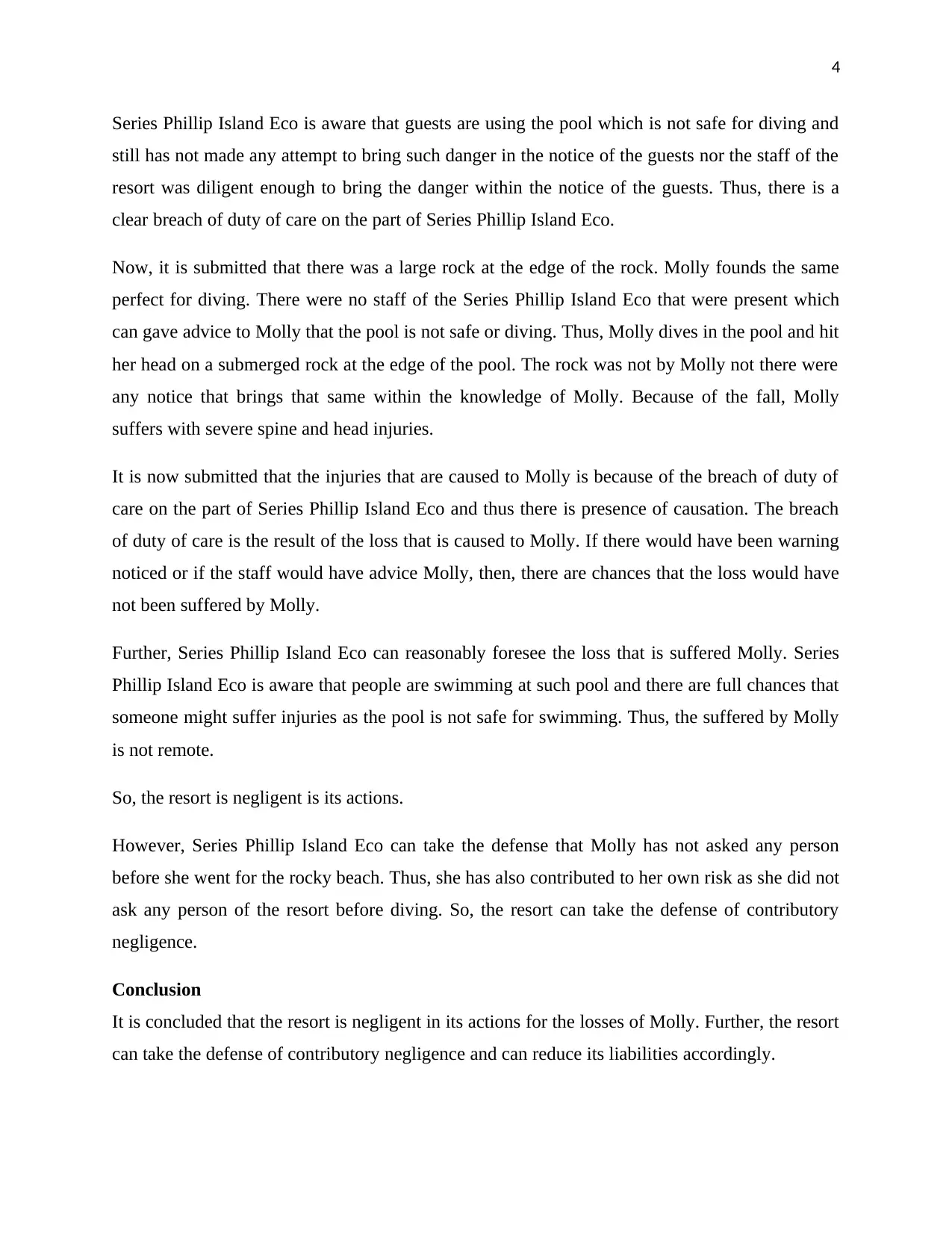
4
Series Phillip Island Eco is aware that guests are using the pool which is not safe for diving and
still has not made any attempt to bring such danger in the notice of the guests nor the staff of the
resort was diligent enough to bring the danger within the notice of the guests. Thus, there is a
clear breach of duty of care on the part of Series Phillip Island Eco.
Now, it is submitted that there was a large rock at the edge of the rock. Molly founds the same
perfect for diving. There were no staff of the Series Phillip Island Eco that were present which
can gave advice to Molly that the pool is not safe or diving. Thus, Molly dives in the pool and hit
her head on a submerged rock at the edge of the pool. The rock was not by Molly not there were
any notice that brings that same within the knowledge of Molly. Because of the fall, Molly
suffers with severe spine and head injuries.
It is now submitted that the injuries that are caused to Molly is because of the breach of duty of
care on the part of Series Phillip Island Eco and thus there is presence of causation. The breach
of duty of care is the result of the loss that is caused to Molly. If there would have been warning
noticed or if the staff would have advice Molly, then, there are chances that the loss would have
not been suffered by Molly.
Further, Series Phillip Island Eco can reasonably foresee the loss that is suffered Molly. Series
Phillip Island Eco is aware that people are swimming at such pool and there are full chances that
someone might suffer injuries as the pool is not safe for swimming. Thus, the suffered by Molly
is not remote.
So, the resort is negligent is its actions.
However, Series Phillip Island Eco can take the defense that Molly has not asked any person
before she went for the rocky beach. Thus, she has also contributed to her own risk as she did not
ask any person of the resort before diving. So, the resort can take the defense of contributory
negligence.
Conclusion
It is concluded that the resort is negligent in its actions for the losses of Molly. Further, the resort
can take the defense of contributory negligence and can reduce its liabilities accordingly.
Series Phillip Island Eco is aware that guests are using the pool which is not safe for diving and
still has not made any attempt to bring such danger in the notice of the guests nor the staff of the
resort was diligent enough to bring the danger within the notice of the guests. Thus, there is a
clear breach of duty of care on the part of Series Phillip Island Eco.
Now, it is submitted that there was a large rock at the edge of the rock. Molly founds the same
perfect for diving. There were no staff of the Series Phillip Island Eco that were present which
can gave advice to Molly that the pool is not safe or diving. Thus, Molly dives in the pool and hit
her head on a submerged rock at the edge of the pool. The rock was not by Molly not there were
any notice that brings that same within the knowledge of Molly. Because of the fall, Molly
suffers with severe spine and head injuries.
It is now submitted that the injuries that are caused to Molly is because of the breach of duty of
care on the part of Series Phillip Island Eco and thus there is presence of causation. The breach
of duty of care is the result of the loss that is caused to Molly. If there would have been warning
noticed or if the staff would have advice Molly, then, there are chances that the loss would have
not been suffered by Molly.
Further, Series Phillip Island Eco can reasonably foresee the loss that is suffered Molly. Series
Phillip Island Eco is aware that people are swimming at such pool and there are full chances that
someone might suffer injuries as the pool is not safe for swimming. Thus, the suffered by Molly
is not remote.
So, the resort is negligent is its actions.
However, Series Phillip Island Eco can take the defense that Molly has not asked any person
before she went for the rocky beach. Thus, she has also contributed to her own risk as she did not
ask any person of the resort before diving. So, the resort can take the defense of contributory
negligence.
Conclusion
It is concluded that the resort is negligent in its actions for the losses of Molly. Further, the resort
can take the defense of contributory negligence and can reduce its liabilities accordingly.
Paraphrase This Document
Need a fresh take? Get an instant paraphrase of this document with our AI Paraphraser
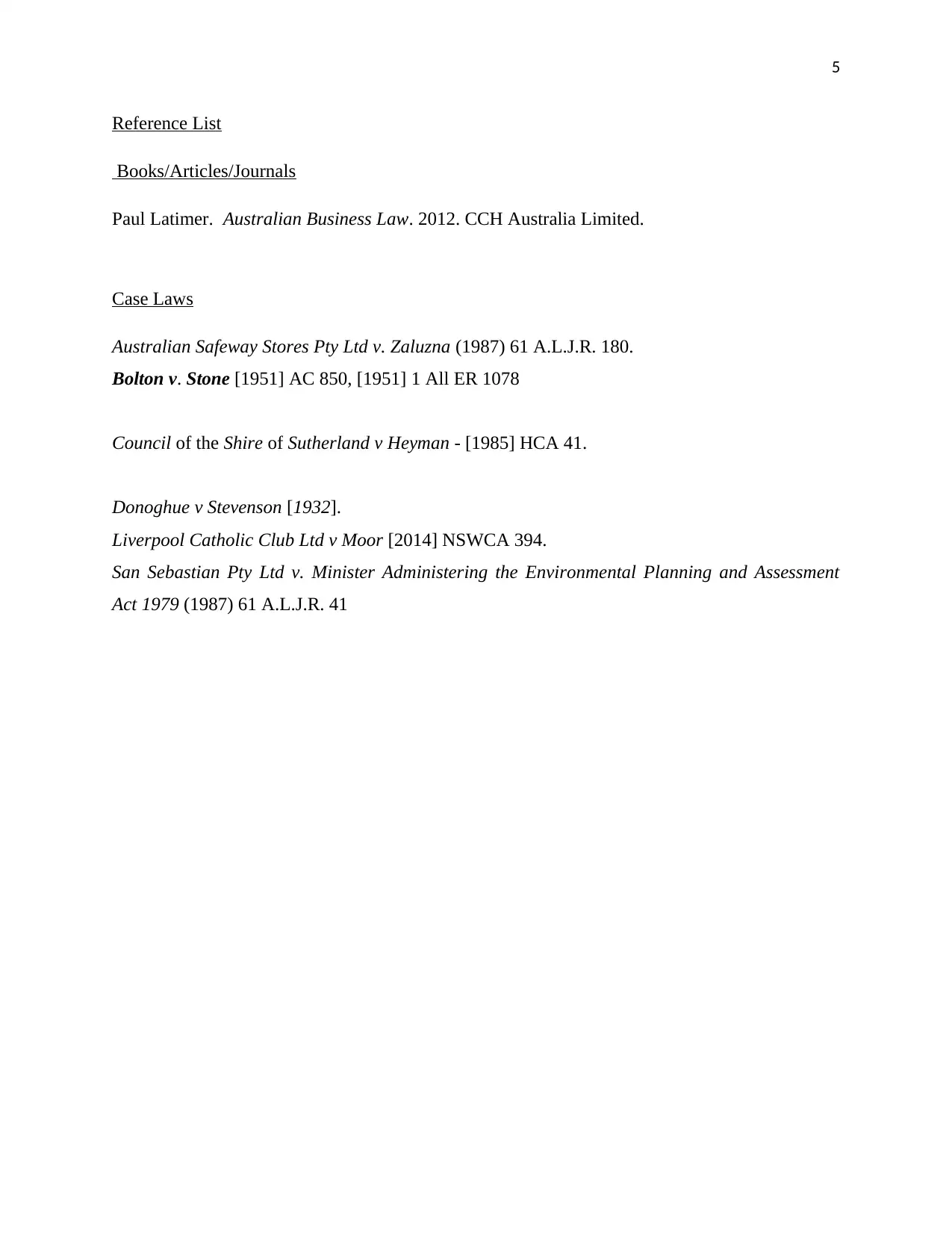
5
Reference List
Books/Articles/Journals
Paul Latimer. Australian Business Law. 2012. CCH Australia Limited.
Case Laws
Australian Safeway Stores Pty Ltd v. Zaluzna (1987) 61 A.L.J.R. 180.
Bolton v. Stone [1951] AC 850, [1951] 1 All ER 1078
Council of the Shire of Sutherland v Heyman - [1985] HCA 41.
Donoghue v Stevenson [1932].
Liverpool Catholic Club Ltd v Moor [2014] NSWCA 394.
San Sebastian Pty Ltd v. Minister Administering the Environmental Planning and Assessment
Act 1979 (1987) 61 A.L.J.R. 41
Reference List
Books/Articles/Journals
Paul Latimer. Australian Business Law. 2012. CCH Australia Limited.
Case Laws
Australian Safeway Stores Pty Ltd v. Zaluzna (1987) 61 A.L.J.R. 180.
Bolton v. Stone [1951] AC 850, [1951] 1 All ER 1078
Council of the Shire of Sutherland v Heyman - [1985] HCA 41.
Donoghue v Stevenson [1932].
Liverpool Catholic Club Ltd v Moor [2014] NSWCA 394.
San Sebastian Pty Ltd v. Minister Administering the Environmental Planning and Assessment
Act 1979 (1987) 61 A.L.J.R. 41
1 out of 5
Related Documents
Your All-in-One AI-Powered Toolkit for Academic Success.
+13062052269
info@desklib.com
Available 24*7 on WhatsApp / Email
![[object Object]](/_next/static/media/star-bottom.7253800d.svg)
Unlock your academic potential
Copyright © 2020–2026 A2Z Services. All Rights Reserved. Developed and managed by ZUCOL.




